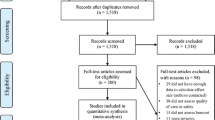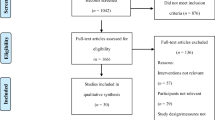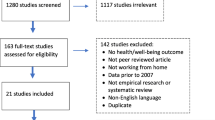Abstract
Background
Little is known about the relationship among systemic racism, psychological symptoms (depression, anxiety, and/or post-traumatic stress disorders), and burnout in healthcare workers (HCWs).
Objective
To determine whether distress related to awareness of systemic racism contributes to psychological symptoms and/or burnout in HCWs. We explored whether this form of racism-related distress may moderate the relationship between race, ethnicity, psychological symptoms, and burnout.
Design
A cross-sectional survey was conducted from November 19, 2020, through January 11, 2021. Statistical analysis was conducted from May 3, 2022, to June 15, 2022.
Participants
Frontline HCWs at an urban tertiary care hospital in New York City.
Main Measures
Distress related to awareness of systemic racism (SR) and racial disparities in COVID-19 outcomes (RD), psychological symptoms, and burnout.
Key Results
Two thousand one of 4654 HCWs completed the survey (response rate 43.0%). Most HCWs reported experiencing distress related to awareness of systemic racism (1329 [66.4%]) and to racial disparities in COVID-19 outcomes (1137 [56.8%]). Non-Hispanic Black participants (SR odds ratio (OR) 2.84, p < .001; RD OR 2.34, p < .001), women (SR OR 1.35, p = .01; RD OR 1.67, p < .001), and those with history of mental illness (SR OR 2.13, p < .001; RD OR 1.66, p < .001) were more likely to report SR- and RD-related distress, respectively. HCWs who experienced “quite-a-bit to extreme” SR-related distress were more likely to screen positive for psychological symptoms (OR 5.90, p < .001) and burnout (OR 2.26, p < .001).
Conclusions
Our findings suggest that distress related to awareness of systemic racism, not race/ethnicity, was associated with experiencing psychological symptoms and burnout in HCWs. As the medical community continues to critically examine the role of systemic racism in healthcare, our work is a first step in characterizing its toll on the psychological well-being of HCWs.


Similar content being viewed by others
Data Availability
The datasets generated during this research are not publicly available due to the confidential nature of the data with respect to mental health outcomes and their relationship to work but may be available upon reasonable request from the corresponding author.
References
Gallup. Would you say relations between White and Black people are very good, somewhat good, somewhat bad or very bad? 2001–2021.
Williams D. They spent months helping Covid-19 patients breathe. Now health care workers are kneeling for George Floyd. CNN. June 8, 2020.
Hailu R. A reckoning for health care professionals: Should they be activists, too? STAT. June 16, 2020.
Witzig RS, Dery M. Subjectively-assigned versus self-reported race and ethnicity in US healthcare. Socl Med. 2014;8:32-36.
Egede LE, Walker RJ. Structural racism, social risk factors, and Covid-19 - a dangerous convergence for Black Americans. N Engl J Med. 2020;383(12):e77-e77.
Reinhart E, Chen DL. Carceral-community epidemiology, structural racism, and COVID-19 disparities. Proc Natl Acad Sci. 2021;118(21):e2026577118.
Gee GC, Ford CL. Structural racism and health inequities: old issues, new directions. Du Bois Rev: Social Science Research on Race. 2011;8(1):115-132.
Bailey ZD, Feldman JM, Bassett MT. How structural racism works — racist policies as a root cause of U.S. racial health inequities. N Engl J Med. 2020;384(8):768-773.
Woolf SH, Chapman DA, Sabo RT, Zimmerman EB. Excess deaths from COVID-19 and other causes in the US, March 1, 2020, to January 2, 2021. JAMA. 2021;325(17):1786-1789.
Yearby R, Clark B, Figueroa JF. Structural racism in historical and modern US health care policy. Health Affairs. 2022;41(2):187-194.
Center for Disease Control and Prevention. Risk for COVID-19 Infection, Hospitalization, and Death By Race/Ethnicity. Accessed December 28, 2022.
Gravlee CC. Systemic racism, chronic health inequities, and COVID-19: A syndemic in the making? Am J Hum Biol. 2020;32(5):e23482-e23482.
Singer M. Introduction to syndemics: A critical systems approach to public and community health. John Wiley & Sons; 2009.
Singer M. A Dose of drugs, a touch of violence, a case of aids: conceptualizing the sava syndemic. Free Inq Creat Sociol. 1996;24:11-22.
Singer M. AIDS and the health crisis of the U.S. urban poor; the perspective of critical medical anthropology. Socl Sci Med. 1994;39(7):931-948.
Paradies Y, Ben J, Denson N, et al. Racism as a determinant of health: a systematic review and meta-analysis. PloS One. 2015;10(9):e0138511.
Williams DR, Lawrence JA, Davis BA. Racism and health: evidence and needed research. Ann Rev Public Health. 2019;40(1):105-125.
Hennein R, Bonumwezi J, Nguemeni Tiako MJ, Tineo P, Lowe SR. Racial and gender discrimination predict mental health outcomes among healthcare workers beyond pandemic-related stressors: findings from a cross-sectional survey. Int J Environ Res Public Health. 2021;18(17).
Saragih ID, Tonapa SI, Saragih IS, et al. Global prevalence of mental health problems among healthcare workers during the Covid-19 pandemic: A systematic review and meta-analysis. Int J Nurs Stud. 2021;121:104002.
Aymerich C, Pedruzo B, Pérez JL, et al. COVID-19 pandemic effects on health worker’s mental health: systematic review and meta-analysis. Eur Psychiatry. 2022;65(1):e10.
Feingold JH, Peccoralo L, Chan CC, et al. Psychological impact of the COVID-19 pandemic on frontline health care workers during the pandemic surge in New York City. Chronic Stress. 2021;5:2470547020977891.
Kaplan CA, Chan CC, Feingold JH, et al. Psychological consequences among residents and fellows during the COVID-19 pandemic in new york city: implications for targeted interventions. Acad Med. 2021.
Phelan JC, Link BG. Is racism a fundamental cause of inequalities in health? Ann Rev Sociol. 2015;41:311-330.
Wallis C. Why Racism, Not Race, Is a Risk Factor for Dying of COVID-19. Scientific American. June 12, 2022.
NYC Health. COVID-19: Data, Trends and Totals - Cases, Hospitalizations and Deaths. 2022.
Brown A. The changing categories the U.S. census has used to measure race. Pew Research Center. February 25, 2020.
Yudell M, Roberts D, DeSalle R, Tishkoff S. Taking race out of human genetics. Science. 2016;351(6273):564-565.
Flanagin A, Frey T, Christiansen SL, AMA Manual of Style Committee. Updated Guidance on the Reporting of Race and Ethnicity in Medical and Science Journals. JAMA. 2021;326(7):621-627.
Shin C, Lee SH, Han KM, Yoon HK, Han C. Comparison of the Usefulness of the PHQ-8 and PHQ-9 for Screening for Major Depressive Disorder: Analysis of Psychiatric Outpatient Data. Psychiatry Investig. 2019;16(4):300-305.
Spitzer RL, Kroenke K, Williams JB, Löwe B. A brief measure for assessing generalized anxiety disorder: the GAD-7. Arch Intern Med. 2006;166(10):1092-1097.
Geier TJ, Hunt JC, Hanson JL, et al. Validation of abbreviated four- and eight-item versions of the PTSD checklist for DSM-5 in a traumatically injured sample. J Trauma Stress. 2020;33(3):218-226.
Shanafelt TD, Boone S, Tan L, et al. Burnout and satisfaction with work-life balance among US physicians relative to the general US population. Arch Intern Med. 2012;172(18):1377-1385.
Mercado M, Wachter K, Schuster RC, et al. A cross-sectional analysis of factors associated with stress, burnout and turnover intention among healthcare workers during the COVID-19 pandemic in the United States. Health Soc Care Communy. 2022;30(5):e2690-e2701.
Harrell SP. A multidimensional conceptualization of racism-related stress: implications for the well-being of people of color. Am J Orthopsychiatry. 2000;70(1):42-57.
Williams DR, Neighbors HW, Jackson JS. Racial/ethnic discrimination and health: findings from community studies. Am J Public Health. 2003;93(2):200-208.
Louie P, Upenieks L. Vicarious discrimination, psychosocial resources, and mental health among Black Americans. Soc Psychol Q. 2022;85(2):187-209.
Moody MD, Lewis JCJ. Lifetime vicarious experiences of major discrimination and depressive symptoms among middle-aged and older black adults. Aging Mental Health. 2022:1–8.
Wyatt TR, Taylor TR, White D, Rockich-Winston N. “When no one sees you as black”: the effect of racial violence on black trainees and physicians. Acad Med. 2021;96(11s):S17-s22.
Kiles TM, Cernasev A, Tran B, Chisholm-Burns M. Effects of racial trauma on black doctor of pharmacy students. Am J Pharm Educ. 2021;85(9):8558.
Dyrbye LN, West CP, Sinsky CA, et al. Physicians’ Experiences with mistreatment and discrimination by patients, families, and visitors and association with burnout. JAMA Netw Open. 2022;5(5):e2213080.
Shechter A, Diaz F, Moise N, et al. Psychological distress, coping behaviors, and preferences for support among New York healthcare workers during the COVID-19 pandemic. Gen Hosp Psychiatry. 2020;66:1-8.
Kisely S, Warren N, McMahon L, Dalais C, Henry I, Siskind D. Occurrence, prevention, and management of the psychological effects of emerging virus outbreaks on healthcare workers: rapid review and meta-analysis. BMJ. 2020;369:m1642.
Vaismoradi M, Fredriksen Moe C, Ursin G, Ingstad K. Looking through racism in the nurse-patient relationship from the lens of culturally congruent care: a scoping review. J Adv Nurs. 2022;78(9):2665-2677.
Kaltiso SO, Seitz RM, Zdradzinski MJ, et al. The impact of racism on emergency health care workers. Acad Emerg Med. 2021;28(9):974-981.
Brenes GA, Knudson M, McCall WV, Williamson JD, Miller ME, Stanley MA. Age and racial differences in the presentation and treatment of Generalized Anxiety Disorder in primary care. J Anxiety Disord. 2008;22(7):1128-1136.
Roberts AL, Gilman SE, Breslau J, Breslau N, Koenen KC. Race/ethnic differences in exposure to traumatic events, development of post-traumatic stress disorder, and treatment-seeking for post-traumatic stress disorder in the United States. Psychol Med. 2011;41(1):71-83.
Bailey RK, Mokonogho J, Kumar A. Racial and ethnic differences in depression: current perspectives. Neuropsychiatr Dis Treat. 2019;15:603-609.
Lawrence JA, Davis BA, Corbette T, Hill EV, Williams DR, Reede JY. Racial/ethnic differences in burnout: a systematic review. J Racial Ethn Health Disparities. 2022;9(1):257-269.
Garcia LC, Shanafelt TD, West CP, et al. Burnout, depression, career satisfaction, and work-life integration by physician race/ethnicity. JAMA Netw Open. 2020;3(8):e2012762.
Cerdeña JP, Plaisime MV, Tsai J. From race-based to race-conscious medicine: how anti-racist uprisings call us to act. Lancet. 2020;396(10257):1125-1128.
Inker LA, Eneanya ND, Coresh J, et al. New creatinine- and cystatin C-Based equations to estimate GFR without race. N Engl J Med. 2021;385(19):1737-1749.
Baugh AD, Shiboski S, Hansel NN, et al. Reconsidering the utility of race-specific lung function prediction equations. Am J Respir Crit Care Med. 2022;205(7):819-829.
Caulfield T, Fullerton SM, Ali-Khan SE, et al. Race and ancestry in biomedical research: exploring the challenges. Genome Med. 2009;1(1):8.
Garvey A, Lynch G, Mansour M, Coyle A, Gard S, Truglio J. From race to racism: teaching a tool to critically appraise the use of race in medical research. MedEdPORTAL. 2022;18:11210.
Njoroge WFM, White LK, Waller R, et al. Association of COVID-19 and endemic systemic racism with postpartum anxiety and depression among black birthing individuals. JAMA Psychiatry. 2022;79(6):600-609.
Lazarus RS, Folkman S. Stress, appraisal, and coping. Springer publishing company; 1984.
Hardeman RR, Burgess D, Murphy K, et al. Developing a medical school curriculum on racism: multidisciplinary, multiracial conversations informed by public health critical race praxis (PHCRP). Ethn Dis. 2018;28(Suppl 1):271-278.
Acknowledgements
The authors wish to thank all the participants at the Mount Sinai Hospital who completed the survey as well as the Office of the Dean who supported this work.
Funding
This study was supported by internal funding devoted to COVID-19-related projects from the Icahn School of Medicine at Mount Sinai.
Author information
Authors and Affiliations
Corresponding author
Ethics declarations
Conflict of Interest
Dr. Lauren Peccoralo received honoraria for speaking engagements at a number of academic medical centers and medical societies. Dr. Jonathan Ripp received honoraria for numerous speaking engagements at professional societies, academic medical centers, healthcare institutions; worked as a consultant for the well-being program at the NYU School of Medicine Long Island; served as a nonfiduciary board member of the Lorna Breen Foundation; and served on a temporary advisory board established by PEPSICO to inform employee well-being efforts. Dr.’s Peccoralo and Ripp are currently investigators on a HRSA training grant. Dr Jordyn Feingold recieved a TL1 grant, consults with BetterUp Coaching and receives royalties for her book. Dr Adriana Feder is an investigator on two CDC-Niosh grants, Dr Robert Pietrzak is a paid consultant to the Office of Well-Being and Resilience at the Icahn School of Medicine at Mount Sinai. All other authors report no conflicts of interests for this work.
Additional information
Publisher's Note
Springer Nature remains neutral with regard to jurisdictional claims in published maps and institutional affiliations.
This work was presented at the International Conference of Physician Health in Orlando, FL, on October 14, 2022.
Supplementary Information
Below is the link to the electronic supplementary material.
Rights and permissions
Springer Nature or its licensor (e.g. a society or other partner) holds exclusive rights to this article under a publishing agreement with the author(s) or other rightsholder(s); author self-archiving of the accepted manuscript version of this article is solely governed by the terms of such publishing agreement and applicable law.
About this article
Cite this article
Tong, M., Hurtado, A., Deshpande, R. et al. Psychological Burden of Systemic Racism-Related Distress in New York City Healthcare Workers During the COVID-19 Pandemic. J GEN INTERN MED 39, 450–459 (2024). https://doi.org/10.1007/s11606-023-08422-x
Received:
Accepted:
Published:
Issue Date:
DOI: https://doi.org/10.1007/s11606-023-08422-x




